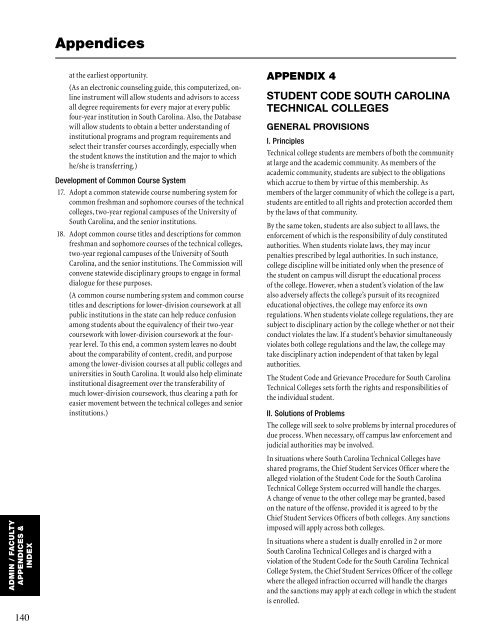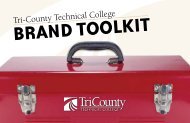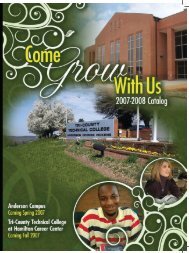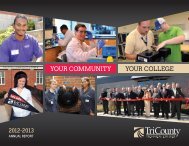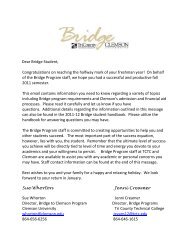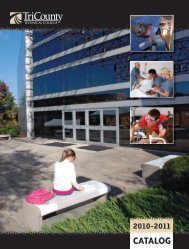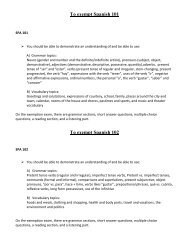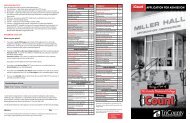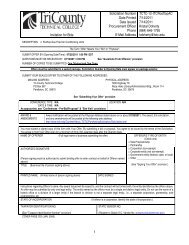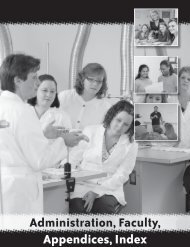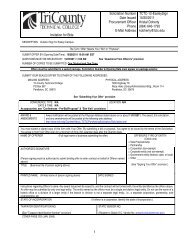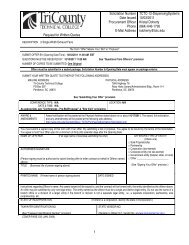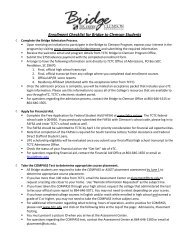2008-2009 CATALOG - Tri-County Technical College
2008-2009 CATALOG - Tri-County Technical College
2008-2009 CATALOG - Tri-County Technical College
Create successful ePaper yourself
Turn your PDF publications into a flip-book with our unique Google optimized e-Paper software.
Appendices<br />
ADMIN / FACULTY<br />
APPENDICES &<br />
INDEX<br />
at the earliest opportunity.<br />
(As an electronic counseling guide, this computerized, online<br />
instrument will allow students and advisors to access<br />
all degree requirements for every major at every public<br />
four-year institution in South Carolina. Also, the Database<br />
will allow students to obtain a better understanding of<br />
institutional programs and program requirements and<br />
select their transfer courses accordingly, especially when<br />
the student knows the institution and the major to which<br />
he/she is transferring.)<br />
Development of Common Course System<br />
17. Adopt a common statewide course numbering system for<br />
common freshman and sophomore courses of the technical<br />
colleges, two-year regional campuses of the University of<br />
South Carolina, and the senior institutions.<br />
18. Adopt common course titles and descriptions for common<br />
freshman and sophomore courses of the technical colleges,<br />
two-year regional campuses of the University of South<br />
Carolina, and the senior institutions. The Commission will<br />
convene statewide disciplinary groups to engage in formal<br />
dialogue for these purposes.<br />
(A common course numbering system and common course<br />
titles and descriptions for lower-division coursework at all<br />
public institutions in the state can help reduce confusion<br />
among students about the equivalency of their two-year<br />
coursework with lower-division coursework at the fouryear<br />
level. To this end, a common system leaves no doubt<br />
about the comparability of content, credit, and purpose<br />
among the lower-division courses at all public colleges and<br />
universities in South Carolina. It would also help eliminate<br />
institutional disagreement over the transferability of<br />
much lower-division coursework, thus clearing a path for<br />
easier movement between the technical colleges and senior<br />
institutions.)<br />
APPENDIX 4<br />
STUDENT CODE SOUTH CAROLINA<br />
TECHNICAL COLLEGES<br />
GENERAL PROVISIONS<br />
I. Principles<br />
<strong>Technical</strong> college students are members of both the community<br />
at large and the academic community. As members of the<br />
academic community, students are subject to the obligations<br />
which accrue to them by virtue of this membership. As<br />
members of the larger community of which the college is a part,<br />
students are entitled to all rights and protection accorded them<br />
by the laws of that community.<br />
By the same token, students are also subject to all laws, the<br />
enforcement of which is the responsibility of duly constituted<br />
authorities. When students violate laws, they may incur<br />
penalties prescribed by legal authorities. In such instance,<br />
college discipline will be initiated only when the presence of<br />
the student on campus will disrupt the educational process<br />
of the college. However, when a student’s violation of the law<br />
also adversely affects the college’s pursuit of its recognized<br />
educational objectives, the college may enforce its own<br />
regulations. When students violate college regulations, they are<br />
subject to disciplinary action by the college whether or not their<br />
conduct violates the law. If a student’s behavior simultaneously<br />
violates both college regulations and the law, the college may<br />
take disciplinary action independent of that taken by legal<br />
authorities.<br />
The Student Code and Grievance Procedure for South Carolina<br />
<strong>Technical</strong> <strong>College</strong>s sets forth the rights and responsibilities of<br />
the individual student.<br />
II. Solutions of Problems<br />
The college will seek to solve problems by internal procedures of<br />
due process. When necessary, off campus law enforcement and<br />
judicial authorities may be involved.<br />
In situations where South Carolina <strong>Technical</strong> <strong>College</strong>s have<br />
shared programs, the Chief Student Services Officer where the<br />
alleged violation of the Student Code for the South Carolina<br />
<strong>Technical</strong> <strong>College</strong> System occurred will handle the charges.<br />
A change of venue to the other college may be granted, based<br />
on the nature of the offense, provided it is agreed to by the<br />
Chief Student Services Officers of both colleges. Any sanctions<br />
imposed will apply across both colleges.<br />
In situations where a student is dually enrolled in 2 or more<br />
South Carolina <strong>Technical</strong> <strong>College</strong>s and is charged with a<br />
violation of the Student Code for the South Carolina <strong>Technical</strong><br />
<strong>College</strong> System, the Chief Student Services Officer of the college<br />
where the alleged infraction occurred will handle the charges<br />
and the sanctions may apply at each college in which the student<br />
is enrolled.<br />
140


